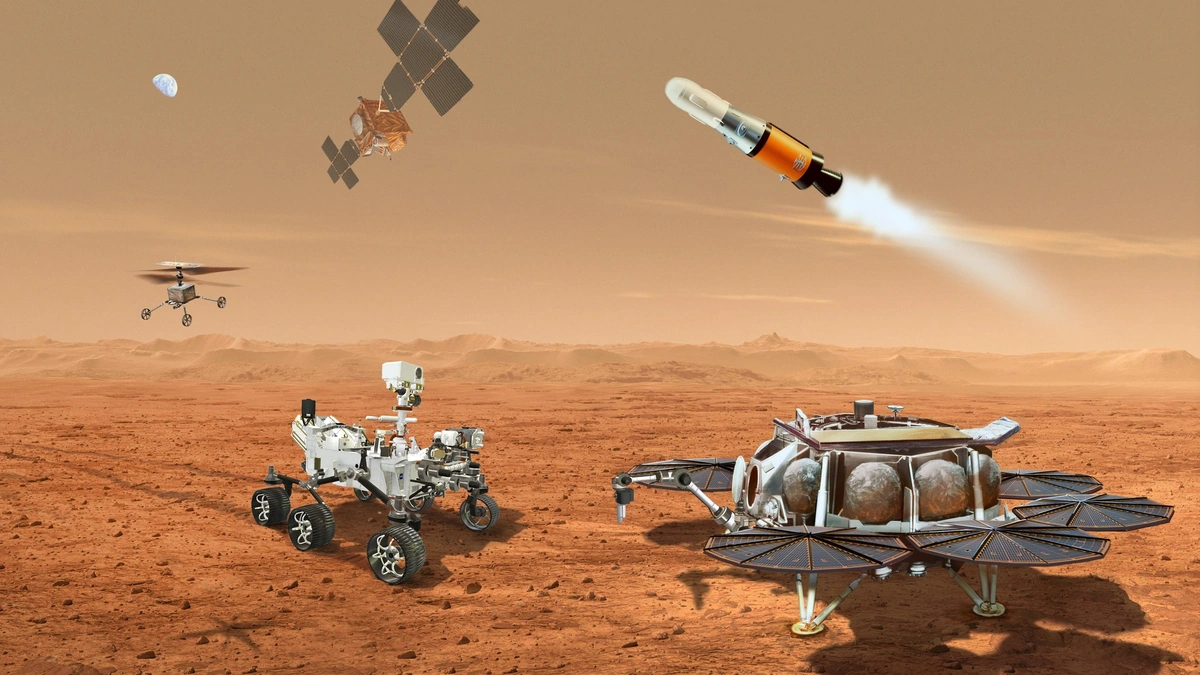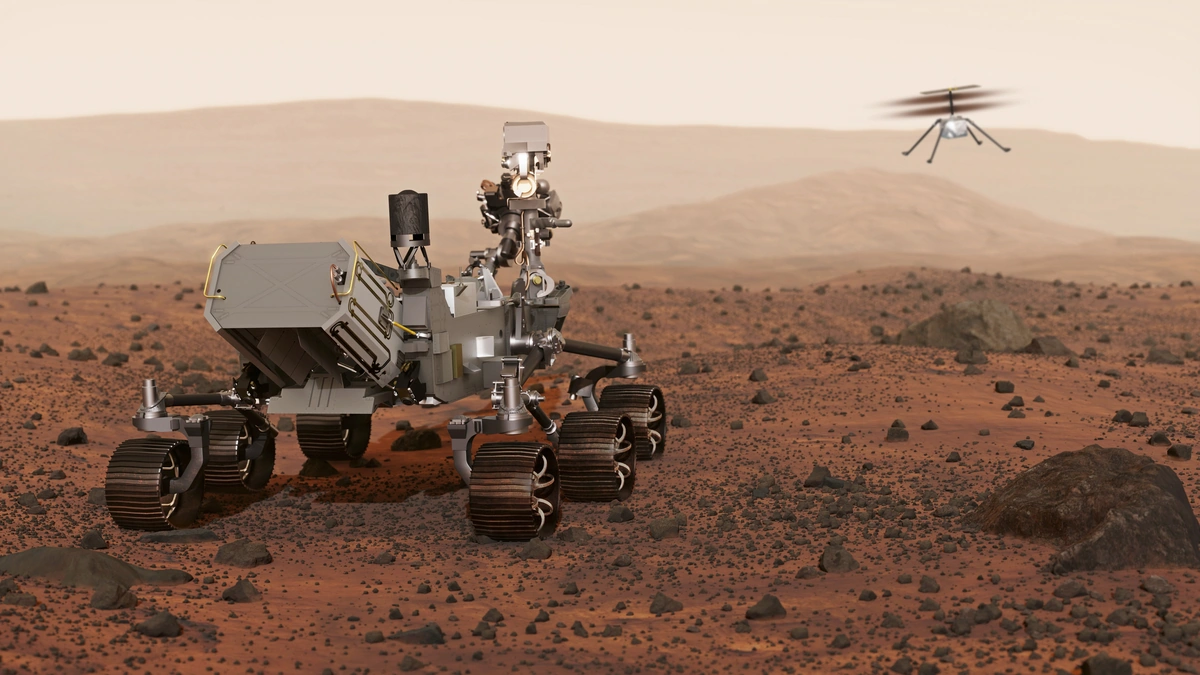Blue Origin Aims to Launch NASA’s Mission to Mars
Here’s the thing about space, right? It’s not just about rockets and astronauts anymore. It’s a whole ecosystem of companies, ambitions, and, let’s be honest, a healthy dose of competition. And when you hear that Blue Origin, Jeff Bezos’ space venture, is aiming to launch NASA’s mission to Mars, it’s more than just a headline. It’s a signal – a signal that the private space race is heating up, and Mars is very much the prize.
Why This Mars Mission Matters—And Why Blue Origin?

So, why does this matter? Well, for starters, a successful Mars mission isn’t just a cool achievement; it’s a massive leap for humanity. Think about it: understanding another planet’s geology, atmosphere, and potential for life could unlock secrets about our own past and future. NASA leading this endeavor is monumental, but the involvement of a private company like Blue Origin adds a layer of complexity and, frankly, excitement.
But why Blue Origin? They’re not exactly the first name that springs to mind when you think of Mars, are they? SpaceX tends to dominate that conversation. But Blue Origin has been quietly building its capabilities. Their New Glenn rocket, designed for heavy payloads, is a key piece of this puzzle. What fascinates me is that this partnership showcases how NASA is increasingly relying on private companies to achieve its ambitious goals.
The New Glenn Rocket | Blue Origin’s Ticket to the Red Planet
Let’s talk about the New Glenn rocket. This isn’t your average firecracker. It’s a beast designed to lift heavy cargo into space – precisely what you need for a deep space mission like one to Mars. It’s reusable, which is crucial for bringing down costs and increasing the frequency of launches. A common mistake I see people make is underestimating the importance of reusability in space travel. It’s not just about saving money; it’s about making space access more sustainable and accessible.
And, the rocket isn’t just for show. Blue Origin’s been working on it for years, investing heavily in its development. This isn’t just about slapping a rocket together; it’s about creating a reliable, robust system that can withstand the rigors of space travel. The company touts its powerful engines and advanced control systems, all essential for navigating the complexities of a long-duration spaceflight . It’s an engineering marvel, and its success is critical to Blue Origin’s future and NASA’s Mars ambitions. As per the development details shared in a recent space industry conference, New Glenn utilizes seven BE-4 engines.
The Challenges Ahead | More Than Just Getting There
Now, let’s be real. Getting to Mars is ridiculously hard. It’s not just about building a big rocket. It’s about tackling a whole host of challenges – from radiation exposure to the psychological effects of long-duration space travel. NASA has been grappling with these issues for decades, and Blue Origin’s involvement brings new perspectives and potentially innovative solutions. One of the largest challenges will be navigating the Martian environment , considering unpredictable weather patterns, including dust storms, which can critically impair landing conditions.
Consider the distance: Mars is, on average, 225 million kilometers away from Earth. That translates to a journey of several months, if not years, depending on the specific trajectory. During this time, astronauts will be exposed to harmful radiation levels, and they’ll have to live in close quarters, which can strain relationships. There are so many things that can go wrong, and the consequences are potentially catastrophic. This complexity is why the collaborative space program approach is growing in popularity.
But, there are the rewards to this complex undertaking.
What This Means for the Future of Space Exploration
Here’s why I think this is particularly important. Blue Origin’s involvement signals a shift in the landscape of space exploration. It’s not just governments leading the charge anymore. Private companies are playing an increasingly significant role, bringing innovation and resources to the table. This increased competition can drive down costs, accelerate technological advancements, and ultimately make space exploration more accessible to everyone. And if you’re curious to learn more about other organizations, check out ISRO , India’s space agency.
I initially thought this was straightforward, but then I realized it’s about the bigger picture: how NASA and Blue Origin approach the challenges of interplanetary travel . Their strategies in the coming years will set the tone for future space endeavors, influencing policy, funding, and public interest. Think about the innovations spurred by the Apollo program they still impact our lives today.
The Indian Angle | What Does This Mean for India?
So, what does all of this mean for India? Well, India has its own ambitious space program, including plans for a Mars orbiter mission. The success of Blue Origin’s efforts could pave the way for greater international collaboration in space exploration. India could potentially partner with NASA or Blue Origin in future missions, sharing expertise and resources. The lessons learned from this mission could also inform India’s own Mars exploration efforts. It’s worth noting that India’s space program has had a substantial amount of success over the years, but still faces many challenges.
Let me rephrase that for clarity: the technologies and strategies developed for this mission could have a ripple effect, benefiting space programs around the world, including India’s. This could accelerate the pace of space exploration and lead to new discoveries. In addition to the Mars mission, India’s work in creating specialized AI chips could also benefit collaborative space programs.
FAQ About Blue Origin’s Mars Mission Ambitions
Frequently Asked Questions
What is Blue Origin’s role in the Mars mission?
Blue Origin aims to provide the launch capabilities using its New Glenn rocket to support NASA’s Mars mission. They’re essentially the transportation provider.
When is the launch expected to take place?
The exact launch date is still TBD, but Blue Origin is actively working towards supporting NASA’s timeline for future Mars missions.
How is Blue Origin’s approach different from SpaceX?
While both companies are key players in space exploration, Blue Origin focuses on reusability and heavy-lift capabilities with its New Glenn rocket, offering a different approach to accessing deep space.
Will this mission involve human astronauts?
That’s part of what makes it so exciting; specifics about human involvement, habitat construction and robotic exploration are still being figured out. Stay tuned for updates.
What happens if the New Glenn rocket fails?
Space exploration always involves risk, and failure is a possibility. However, extensive testing and safety protocols are in place to minimize the chances of failure.
Ultimately, Blue Origin aiming to launch NASA’s mission to Mars isn’t just a news story; it’s a sign of the changing times. The private space race is real, the stakes are high, and the potential rewards are immense. It’s a story worth watching, because it’s a story about our future among the stars.













